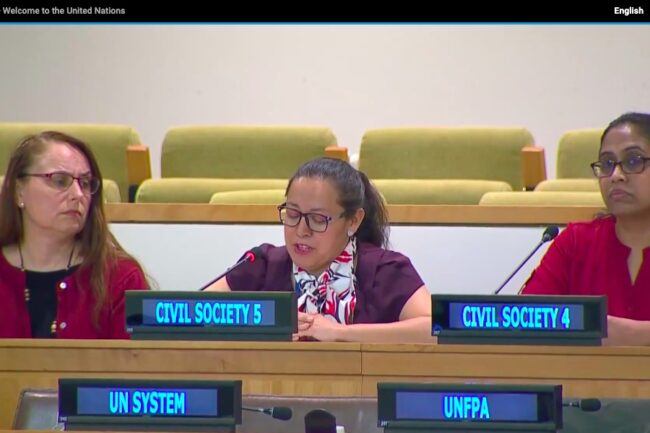A right to care to foster quality non-formal education
03.05.23
UN New York - Our oral statement to the UN Commission on Population Development calls for for the recognition of the importance of non formal education, which mostly takes place within families. It includes the transmission of values, as well as the learning of soft and life skills. It is intrinsically linked to the unpaid work of caring and raising children. Recognizing care as a right would support this unpaid work that mothers do as the first non formal educators of their children.


The following is the text of MMM’s oral statement to the Commission, which was delivered on 12 April 2023 by Jacqueline Leduc, our representative to the UN in New York.
We would like to emphasize the importance of parents and families in the daily education of children as primary educators and carers, especially mothers, who play an essential role that must be recognized, valued and supported.
Against the profound and global changes and challenges, education systems must adapt to the evolving skills required and develop critical thinking, respect, empathy, and creativity.
Yet, soft skills learning and the passing on of the values of respect and benevolence mostly takes place in informal or non-formal education contexts – in particular through everyday family member interactions. Peace and sustainable development begin in the home.
A nurturing family environment is also key for Early Childhood Development: scientific evidence shows how early education and care shapes our overall future development, including the acquisition of vital skills. Family interest and support are instrumental to a child’s self-confidence and success at school.
Non-formal education within families is the product of unpaid care work. But globally, women spend 3.2 more time on unpaid domestic and care work than men, and are heavily penalized from the resulting time poverty. Mothers have to juggle multiple roles inside and outside the home, to the detriment of their financial independence and security. To redress this inequity, men must take their share of responsibility. This is an important lever for greater gender equality and increased recognition of care work. It also reduces violence and fosters the wellbeing of the entire family. But this is not enough.
At MMM, we believe it is time for formal, informal and non-formal education to unite in the pursuit of a common goal, empowering children, building sustainable development and peace, and recognizing that education is intrinsically linked to unpaid care work.
For children to enjoy their right to education in its broadest sense, parents and other caregivers must be empowered, not penalized
A right to care would foster quality non-formal education: it would assert unpaid care work as a collective responsibility and put obligations on States to take their share, and develop legal frameworks, policies and services to support families as the primary educators of their children.
We are therefore calling on member States to recognize Care as a Right – the Right to Care and the Right to be cared for. It will support a much-needed transformation of education, and catalyse sustainable development.
The 56th UN Commission on Population Development took place 10-14 April 2023 at the UN headquarters in New York, with the special theme: Population, education and sustainable development.
The New EU Gender Equality Roadmap : A Call for Inclusion of Mothers
04.03.25
The European Commission’s initiative on a new Gender Equality Roadmap post-2025, marks a significant step forward in addressing gender disparities across the European Union. Make Mothers Matter (MMM
Breaking the Cycle: Gender Equality as a Path to Better Mental Health
18.03.25
The Council of the European Union has taken a decisive step in recognising the vital connection between gender equality and mental health.
Europe Must Listen to Mothers: Our landmark report heads to the European Parliament
28.08.25
On 22 September 2025, the voices of mothers will take centre stage in Brussels. For the first time, Make Mothers Matter (MMM) will present its State of Motherhood in Europe








